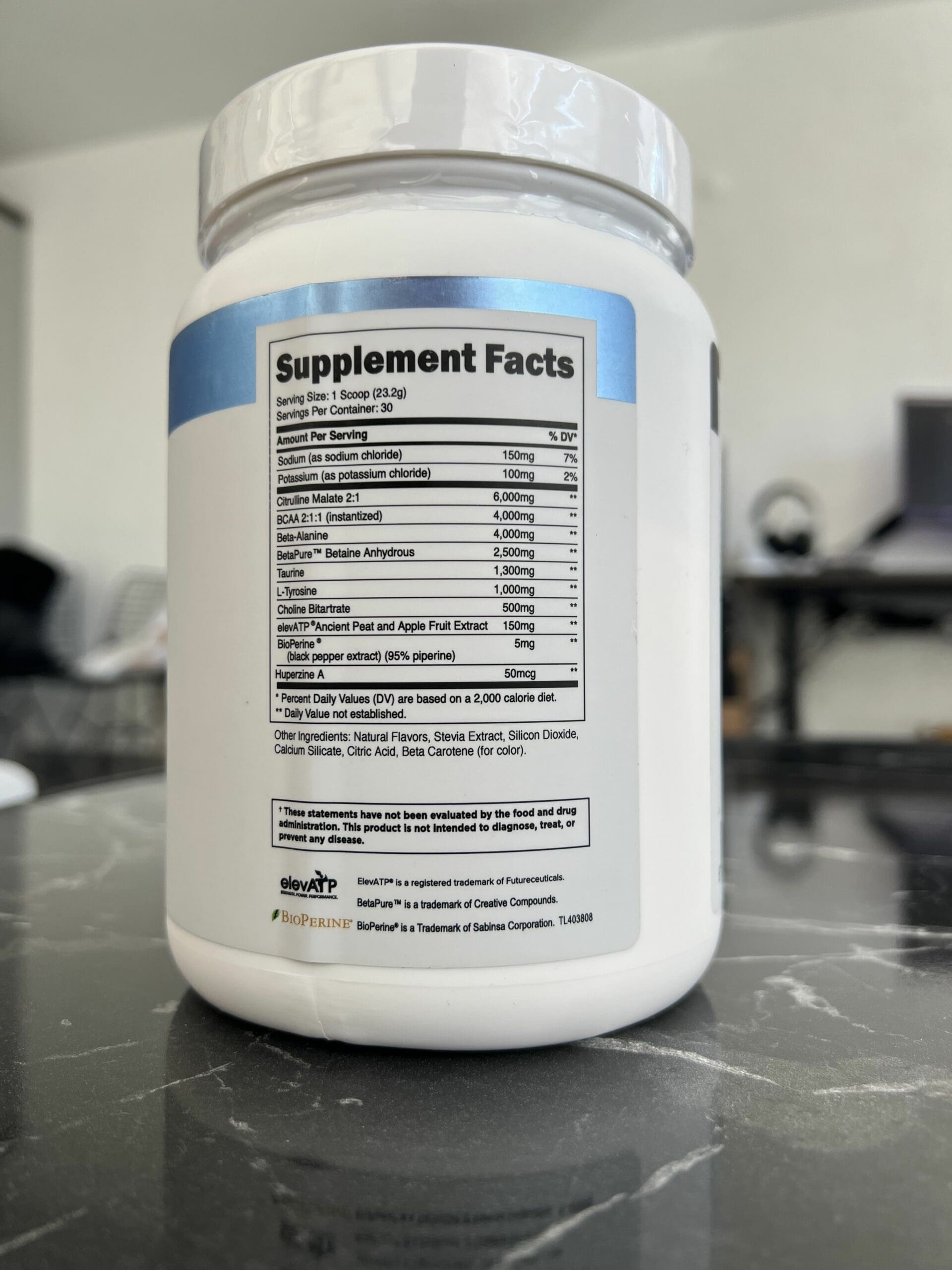
Many have turned to pre-workout supplements for peak gym and study room performance.
Known for their energy-boosting properties, these supplements are a staple for many athletes and fitness enthusiasts.
But can these pre-workouts also be used for studying?
Let's dive into the science and find out.
Pre-workout supplements are typically associated with gym-goers and athletes looking for an extra edge in their training.
However, these potent concoctions aren't just for the gym.
They can also be a secret weapon for those hitting the books, not just the weights.
Let's dig further into pre-workouts and if they can be used for studying...

Yes, pre-workout supplements can be used for studying as they contain ingredients that can enhance cognitive functions such as focus and memory.
However, it's important to choose a product with suitable ingredients and dosages and to consult a healthcare professional before starting any new supplement regimen.
Pre-workout supplements increase energy, focus, and endurance during a workout.
They typically contain a blend of ingredients like caffeine, amino acids, and other nutrients that work together to enhance physical performance.
But these same ingredients can also significantly affect the brain, making pre-workouts a potential ally for studying.
Many of the ingredients in pre-workout supplements are known to have cognitive benefits.
For example, caffeine, a common ingredient in pre-workouts, is a well-known cognitive enhancer that can improve alertness and concentration.
Other ingredients like L-Theanine can promote relaxation and focus, making staying engaged with your study material easier.
Pre-workout supplements often contain ingredients designed to boost physical performance, but many can also enhance cognitive function.
For example, caffeine can increase alertness and concentration, while amino acids like L-Theanine can promote relaxation and focus.
Other ingredients like creatine and beta-alanine may also have cognitive benefits.
Here are some key ingredients that can enhance focus and are often found in pre-workouts:
Nootropics can enhance cognitive function, particularly executive functions, memory, creativity, or motivation.
Here are some common nootropics found in pre-workouts:
An amino acid found in tea leaves, L-Theanine is known for promoting relaxation without drowsiness.
It's often paired with caffeine to enhance the benefits of both substances.
Derived from a type of firmoss known as Huperzia serrata, Huperzine A is used for memory, learning enhancement, and age-related memory impairment.
An herb used in traditional medicine for improving memory, reducing anxiety, and treating epilepsy, among other things.
Rhodiola Rosea is a plant used in traditional medicine in Eastern Europe and Asia known for improving mood, reducing stress, and enhancing brain function.
DMAE (Dimethylaminoethanol): DMAE is a compound that may increase levels of the neurotransmitter acetylcholine, which is important for memory and learning functions.
It's often used in nootropic supplements to enhance memory and cognitive performance.
Choline: Choline is an essential nutrient that is used by the body in a number of ways, including the production of acetylcholine.
There are several forms of choline used in supplements, including:
This is a basic form of choline that is often used in dietary supplements.
It's a good source of choline but not as potent as some other forms.
Citicoline is a more potent form of choline with nootropic benefits, such as improving memory and cognitive function.
Alpha GPC is another potent form of choline often used in nootropic supplements.
It's been shown to support cognitive function and may enhance power output in athletes.
These ingredients can be found in many pre-workout supplements and can significantly boost cognitive function, making them potentially beneficial for studying.
Stimulants increase activity in the body and brain, often enhancing alertness and energy levels.
Here are some common stimulants found in pre-workouts:
Caffeine: Perhaps the most well-known stimulant, caffeine can increase alertness and reduce feelings of fatigue.
It's a common ingredient in pre-workouts and can be particularly beneficial for studying.
Guarana: A plant native to the Amazon, guarana naturally contains caffeine, and is often used for its stimulant and weight loss benefits.
Yerba Mate: A traditional South American drink, yerba mate contains natural stimulants, including caffeine, theobromine, and theophylline.
Green Tea Extract: Known for its health benefits, it contains caffeine and is often used for its stimulant effects.

The ingredients in pre-workout supplements can help enhance focus and memory in several ways.
Caffeine, for example, blocks adenosine receptors in the brain, which can help increase alertness and reduce feelings of fatigue.
On the other hand, L-Theanine promotes relaxation and can help reduce stress and anxiety, making it easier to focus on studying.
Pre-workouts can be a powerful tool for enhancing focus and memory, making them a potential ally for students and anyone else who needs to perform at their cognitive best.
But how exactly do pre-workouts achieve this?
Let's dive into the science behind it.
Many pre-workout ingredients, such as caffeine and certain amino acids, have vasodilatory effects, widening your blood vessels and increasing blood flow.
This increased blood flow can deliver more oxygen and nutrients to your brain, helping it function more effectively.
Some pre-workout ingredients can directly influence your brain's neurotransmitters.
Neurotransmitters are chemicals that your brain cells use to communicate with each other.
By influencing these neurotransmitters, pre-workout ingredients can affect various aspects of brain function, including focus and memory.
For example, caffeine, a common ingredient in pre-workouts, is known to block adenosine receptors in the brain.
Adenosine is a neurotransmitter that promotes sleep and relaxation, so by blocking its effects, caffeine can promote alertness and focus.
Research shows that physical activity, often paired with pre-workout consumption, can also enhance working memory abilities.
Some pre-workouts contain nootropic ingredients, substances that are specifically designed to enhance cognitive function.
These can include compounds like DMAE and various forms of choline, which can increase levels of the neurotransmitter acetylcholine in the brain.
Acetylcholine is crucial for memory and learning functions, and increasing its levels can potentially enhance these aspects of cognition.
Lastly, it's worth noting that pre-workouts can also enhance focus and memory simply by boosting your energy levels.
Your cognitive performance is likely to suffer if you're tired or sluggish.
Pre-workouts can help you overcome this hurdle and perform at your best by providing a quick energy source.
Pre-workouts can enhance focus and memory through a variety of mechanisms.
Caffeine is a key ingredient in many pre-workout supplements and for a good reason.
It's a powerful stimulant that can help increase alertness and reduce feelings of fatigue.
This can be particularly beneficial for studying, as it can help you stay focused and alert, even during long study sessions.
While caffeine-based pre-workouts can be effective for studying, they're not the only option.
Non-stimulant pre-workouts can also be beneficial.
These supplements typically contain ingredients like amino acids, vitamins, and minerals that can support brain health and cognitive function without the stimulating effects of caffeine.

Using pre-workout supplements for studying can have several benefits, including increased focus and alertness, improved memory, and reduced feelings of fatigue.
However, there can also be downsides, including potential side effects like jitters, insomnia, and increased heart rate.
It's important to weigh these pros and cons before using pre-workouts for studying.
While pre-workout supplements can benefit studying, they're not for everyone.
Some people may be sensitive to the ingredients in these supplements, particularly stimulants like caffeine.
It's always a good idea to talk to your doctor before starting any new supplement regimen, including pre-workouts.
If pre-workout supplements aren't for you, there are other ways to enhance your study sessions.
Regular exercise, a healthy diet, and plenty of sleep can all support brain health and cognitive function.
Also, mindfulness and meditation can help improve focus and reduce stress.
Choosing the right pre-workout for studying can be a bit of a challenge, given the wide array of available options.
However, by keeping a few key factors in mind, you can make an informed decision that best suits your needs.
Firstly, consider the ingredients. Look for pre-workouts that contain proven cognitive enhancers, such as caffeine, L-theanine, DMAE, and various forms of choline.
These ingredients can help boost focus, memory, and overall cognitive function, making them ideal for study sessions.
Secondly, consider the dosage.
Pre-workouts can vary significantly in terms of their ingredient concentrations.
It's important to choose a product that contains effective doses of its key ingredients.
Too little, and you may not see any benefits.
Too much, and you could experience side effects.
Thirdly, consider your tolerance to stimulants.
For example, if you're sensitive to caffeine, you might opt for a stimulant-free pre-workout or one with a lower caffeine content.
Lastly, consider the product's reviews and reputation.
A product that is well-reviewed by other users and comes from a reputable company is likelier to deliver on its promises.
For a comprehensive list of nootropic pre-workouts, check out our resource on nootropic pre-workouts.
One of our top recommendations is Mindseries Nootropic, a nootropic supplement designed to enhance cognitive function, making it a great choice for those study sessions.
Everyone is different, and what works best for one person may not work well for another.
Finding the pre-workout that works best for you may take some trial and error.
If you decide to use a pre-workout supplement for studying, there are a few tips to keep in mind.
First, start with a small dose to see how your body reacts.
Second, try to time your supplementation so that the effects peak during your study session.
Finally, remember to stay hydrated, as many pre-workout supplements can have a diuretic effect.

Here are some common questions about using pre-workout supplements for studying:
What are the best pre-workout supplements for studying?
The best pre-workout for studying will depend on your individual needs and sensitivities. However, look for a supplement with ingredients that support brain health and cognitive function, like caffeine, L-Theanine, and creatine.
Can pre-workout supplements cause side effects?
Yes, pre-workout supplements can cause side effects, particularly if they contain stimulants like caffeine. These can include jitters, insomnia, and increased heart rate.
Are there non-stimulant pre-workout supplements for studying?
Yes, there are non-stimulant pre-workout supplements available. These typically contain ingredients like amino acids, vitamins, and minerals that can support brain health and cognitive function without the stimulating effects of caffeine.
Can I use pre-workout supplements for studying?
Yes, pre-workout supplements contain ingredients that can enhance cognitive functions, making them potentially useful for studying.
How do pre-workouts enhance focus and memory?
Pre-workouts can enhance focus and memory by increasing blood flow to the brain, influencing neurotransmitters, providing energy, and including specific nootropic ingredients.
Are pre-workouts safe to use for studying?
While pre-workouts can be safe for most people, it's always best to consult a healthcare professional before starting any new supplement regimen.
Can I use pre-workouts for studying if I don't work out?
Yes, the cognitive enhancing effects of pre-workouts can be beneficial even if you don't work out.
What are some common ingredients in pre-workouts that can enhance focus and memory?
Common ingredients include caffeine, L-theanine, DMAE, and various forms of choline.
Can I use pre-workouts for late-night study sessions?
While pre-workouts can enhance focus and memory, they often contain stimulants like caffeine that can interfere with sleep. It's best to avoid taking them late at night.
Are there any side effects of using pre-workouts for studying?
Potential side effects can include restlessness, jitteriness, and sleep disturbances, especially if taken late in the day.
Can I take pre-workouts on an empty stomach?
While some people can tolerate pre-workouts on an empty stomach, others may experience stomach upset. It's best to see how your body reacts.
How long before studying should I take a pre-workout?
Taking a pre-workout 30-60 minutes is generally recommended before you plan to study.
Can I use pre-workouts instead of coffee for studying?
While pre-workouts and coffee contain caffeine, pre-workouts often contain additional ingredients to enhance focus and memory. However, they also tend to have higher caffeine content, so monitoring your intake is important.
In conclusion, pre-workout supplements can be a powerful tool for studying, offering increased focus, energy, and even improved memory.
However, they're not for everyone, and it's important to consider your individual needs and sensitivities before deciding to use pre-workouts for studying.
Talking to your doctor before starting any new supplement regimen is a good idea.
Useful Links
 About FitFrek
About FitFrekFitFrek operates as an independent platform, offering comprehensive workouts, programs, routines, guides, and unbiased reviews to accelerate your progress. We pride ourselves on our honesty, delivering straightforward and candid insights. FitFrek does not offer medical advice, diagnosis, or treatment services.